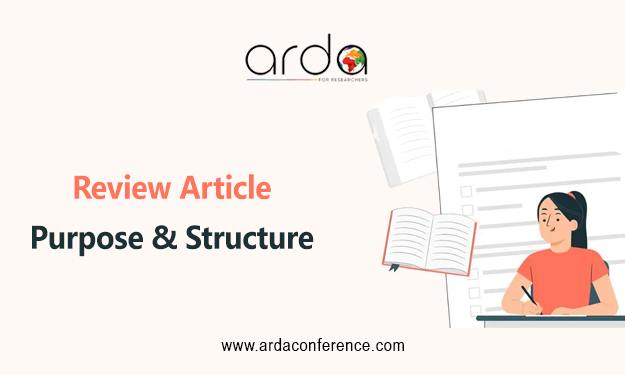All you need to know about review article – purpose and structure
A review article is a form of scientific literature that provides an extensive summary, analysis, and synthesis of existing research on a specific topic. Review research article plays a crucial role in academic and scientific research by offering a comprehensive overview of a research paper, highlighting key findings, and identifying gaps or areas. In this article, we will guide you about the purpose, structure, and importance of review articles. Keep reading!

Purpose of Review Articles
Review articles serve several essential purposes in the world of academic and scientific literature. They are invaluable for both researchers and readers. Here are the primary purposes of review articles:
Summarizing Existing Research: One of the main purposes of a review article is to provide a concise and comprehensive summary of the current research on a specific topic. It organizes a wealth of information from various sources, allowing you to grasp the key findings without having to navigate through numerous original research papers.
Identifying Trends and Patterns: Review articles often help identify trends and patterns in the existing literature. By analyzing a wide range of studies, they can uncover common themes, emerging paradigms, or recurring controversies within a particular field.
Evaluating Methodologies and Quality: These articles critically assess the methodologies employed in the studies they review. Researchers can gain insights into the strengths and weaknesses of various research approaches, which can guide their own study design.
Providing Historical Context: Review article writing can offer historical context by tracing the development of a particular field of study. They highlight key milestones, pivotal studies, and the evolution of theories and concepts over time.
Suggesting Directions for Future Research: Review articles often conclude by proposing potential areas for future research. By identifying gaps in the current literature, they inspire researchers to explore new questions and contribute to the advancement of knowledge.
How to Review Research Paper
Here are some tips for reviewing research paper:
Read the Paper Carefully
You should start by reading the entire research paper thoroughly. Take your time to understand the research, methodology, and results. And, note your initial impressions, including any confusion or concerns.
Evaluate the Title and Abstract
Check whether the title accurately reflects the paper’s content or not. Determine if the abstract provides a clear and concise summary of the research.
Analyze the Introduction
Next, you should evaluate the introduction for clarity and relevance to the title. Consider if the paper effectively justifies the research question and its importance.
Check the Methodology
Check if the methodology is well-described and replicable. Also, look for potential biases or limitations in the research methods and design.
Evaluate the Results
Determine if the results of a research paper are presented logically and clearly. Also, ensure that data analysis and statistics are right. Look for any inconsistencies with the research question and hypothesis.
Review the References
Now, you have to carefully check the reference. Ensure that all cited sources are accurate and relevant. Check for missing references or over-reliance on specific sources.
After all this, you can write your review article and submit it.
What is the Structure of Review Articles
The structure of a review article follows a well-defined pattern to ensure clarity. Here is the general structure:
- Title: Your title should be concise and clearly convey the focus of the review.
- Abstract: In this, write a brief summary of the review article’s main objectives, methods, findings, and conclusions.
- Introduction: This section introduces the topic, provides a rationale for the review, and outlines your review article’s objectives.
- Methods: Review research paper may discuss the methods used to select and screen relevant research papers. This section may also detail the criteria for inclusion and exclusion.
- Results: This part of the research article summarizes the key findings of the reviewed studies. It is usually organized by subtopics or themes, with a focus on synthesizing the information.
- Discussion: The discussion section critically analyses and interprets the results, highlighting patterns, controversies, and gaps in the literature.
- Conclusion: The conclusion of the article reviewer provides a summary of the main points, discusses the implications of the findings, and suggests future research directions.
- References: A comprehensive list of the sources cited in the review article.
If you are not aware of how to write a review article, then you can reach us for review article writing. We have years of experience in writing review articles on various subjects and for various journals. You can reach us any time for help.
FAQs
How do I identify a reliable review article?
Reliable review articles are typically published in reputable academic journals. They should clearly state their methodology for selecting and reviewing papers and provide a comprehensive list of references.
Are review articles peer-reviewed like original research papers?
Yes, most review articles undergo a peer-review process, just like original research papers, to ensure their quality and accuracy.
Are there different types of review articles?
Yes, there are several types of review articles, including narrative reviews, systematic reviews, and meta-analyses. Each type has a distinct approach to reviewing and synthesizing research.
How often should review articles be updated?
Review articles should be updated periodically to reflect the most recent research in the field. The frequency of updates depends on the rate of change in the subject matter.
Can I use review articles as primary sources for my research?
While review articles are excellent starting points to review research paper, it is advisable to use original research papers as primary sources whenever possible.
